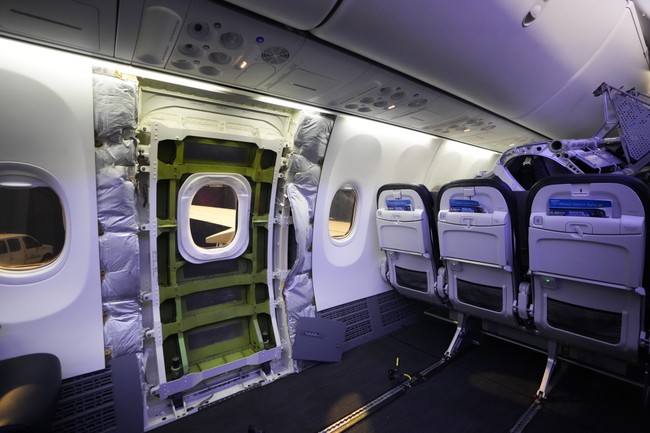Top News
Boeing Sued Over Blowout, Poor Maintenance

I suppose this was inevitable. After the disastrous blowout of a door plug on an Alaska Airlines flight over Portland in January, a great deal of scrutiny was applied to Boeing’s 737 MAX series of aircraft and the safety and maintenance procedures the company employs. But what of the passengers on the flight? Thankfully, nobody was sucked out of the plane, killed, or even seriously injured. One teenager had his shirt pulled off of him by the suction, but otherwise, everyone seemed to be mostly okay, though understandably shaken up. But now, just short of two months later, three of the passengers from the flight are suing Boeing and Alaska Airlines for one billion dollars. We should have known that the lawyers would be circling this situation like sharks, but the people bringing the suit will need to be able to demonstrate damages. (NY Post)
A trio of passengers are suing Alaska Airlines and aircraft manufacturing giant Boeing for $1 billion over the horrific Jan. 5 flight that took off from Portland, Oregon, and had a massive cabin panel blowout.
Images of the gaping fuselage hole that nearly caused disaster went viral — and the suing passengers told new terrifying stories of their experience after filing suit, including of a teen’s shirt nearly getting sucked out.
“We took off fine and then just five minutes, and we heard the loud pop,” passenger Kyle Rinker told KGW News, referring to a door plug blowing off, creating a gaping hole in the 737 MAX 9 plane.
The lawsuit is being brought by Kyle Rinker and his girlfriend Amanda Strickland, along with a third passenger named Kevin Kwok. Rinker and Strickland were sitting only a couple of aisles away from the blowout and Rinker was already posting pictures of the incident to Twitter while the flight was in process.
When the wall of the plane just breaks off mid flight @AlaskaAir pic.twitter.com/pMWhpiHmFY
— Kyle Rinker (@Kyrinker) January 6, 2024
I’ve written quite a bit about the issues with Boeing’s “flying junkyards” and the need for better inspections and safety protocols. I can also certainly understand how being on that flight over Portland would have been a distressing experience for everyone involved. Rinker and his girlfriend described how cold the air was when it rushed into the cabin at 16,000 feet.
But even with all of that said, did anyone on the flight really suffer injuries that would justify one billion dollars in damages? The plaintiffs are claiming that they are filing the suit “on behalf of” all of the passengers, but only three of them have put their names on it. The kid who had his shirt ripped off might be entitled to something, but everyone else made it back to the terminal safely. Perhaps we could make the argument that all of the passengers were traumatized by the event, but what’s the cash value of a traumatic experience?
Speaking as a former skydiver, I’ve been in a plane with the door open at nearly 14,000 feet, which is close to the altitude that the Alaskan Airlines flight reached. It can be loud and the air is indeed cold up there, no matter what the weather looks like on the ground. And if you’re not expecting to be exposed to the external environment, I’m sure it’s alarming. (For the record, jumping out of a plane can be pretty alarming also, at least the first time you do it.)
But the air up there is breathable, at least for a while, and the passengers in question all had functional oxygen masks available. Aside from being shaken up a bit, nobody suffered any lasting injuries. Is being “shaken up” really worth a billion-dollar payday? It might go a way toward teaching Boeing a lesson and getting them to take their maintenance responsibilities more seriously, but even if the plaintiffs prevail, the airline company has deep pockets and their insurance would probably cover most of the damages. And how is Alaska Airlines liable in all of this? They rely on the manufacturer and the government to ensure the planes they fly are up to snuff.
I can’t escape the feeling that we’re seeing a major cash grab unfolding here. The driving force behind this is probably some slick lawyers who saw the possibility of a fast hit on a company with deep pockets who would like to avoid further embarrassment. They were probably circling and looking for clients as soon as the plane landed. Boeing needs to be held accountable and they must do better in their maintenance routines, but in the end, this was an accident. And that accident thankfully didn’t produce any deaths or serious injuries. An effort to soak them for a billion dollars isn’t going to make air travel any safer and will likely only fatten the coffers of a few lawyers.
Read the full article here








